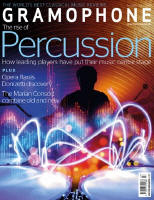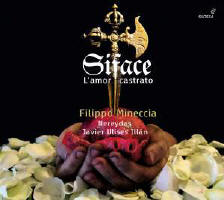Texte paru dans: / Appeared in: |
|
 |
Outil de traduction (Très approximatif) |
|
Reviewer:
Tim Ashley Filippo Mineccia’s new recital takes as its starting point the circumstances surrounding the death, on May 29, 1697, of the castrato Giovanni Francesco Grossi, known Europe-wide as Siface after the role of the Numidian warrior in Cavalli’s Scipione Africano in which he made his name in Rome in 1671. Depending on the age at which the operation was performed, castration did not necessarily preclude sexual activity in adulthood; and some months before his death, Siface, who spent most of his career in the service of Francesco d’Este, Duke of Modena, began an affair with Elena Marsili, a widowed Countess at his patron’s court, to the horror of her brothers, who conspired with hired assassins to have the singer shot. To chart the progress of the affair, Mineccia creates ‘a small imaginary opera-pasticcio for a single character’ by forging extracts from the operas and oratorios with which Siface was primarily associated into an amatory, at times erotic, emotional narrative. The boundaries between sacred and secular are deliberately blurred as the saint’s arias from Stradella’s San Giovanni Battista are pressed into service to express sexual rather than spiritual desire, and a scene from Bassani’s Il Giona hints at existential defiance as we approach the catastrophe. Francesco d’Este’s sister was Mary of Modena, wife of James II. Siface famously worked in London during the latter’s reign, though he apparently couldn’t abide the climate and left earlier than anticipated. Mineccia includes Purcell’s ‘My song shall be alway’, though whether it was written for Siface is debatable: its tessitura, one notices, lies fractionally higher than the rest of the music Mineccia gives us here. This is repertory, however, that for the most part suits his dark, handsomesounding alto uncommonly well. Long, slowly unfolding lines are sustained with consummate ease and his coloratura has admirable liquidity. You’re aware of pressure at times in his upper registers, and ‘My song shall be alway’, in particular, lies fractionally too high for him. Against that must be set the beauty of his soft singing. The pianissimos with which he begins ‘Hor ch’in sopor profondo’ from Agostini’s Il ratto delle Sabine are at once sensual and exquisite, and the hushed, valedictory closing aria, ‘Dormi o fulmine’ from Alessandro Scarlatti’s La Giuditta, is simply breathtaking. The Spanish period ensemble Nereydas play with precision and élan for Javier Ulises Illán, coming into their own in the orchestral extracts that signal shifts in mood as the recital progresses. It’s a fascinating disc. Do listen to it. |
|




